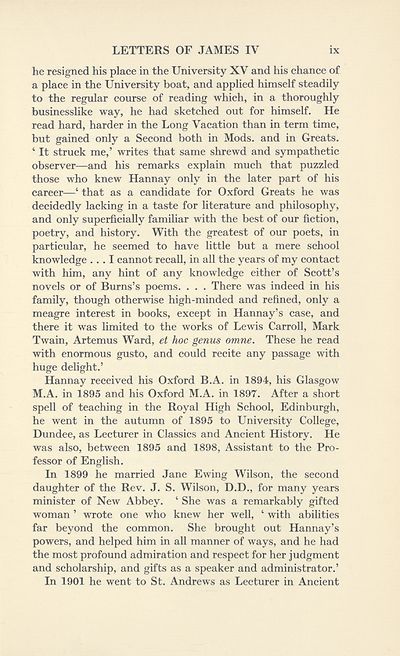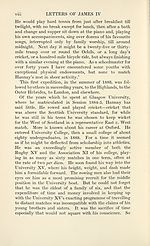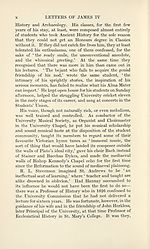Series 3 > Letters of James the Fourth, 1505-1513
(16) Page ix
Download files
Complete book:
Individual page:
Thumbnail gallery: Grid view | List view

LETTERS OF JAMES IV ix
he resigned his place in the University XV and his chance of
a place in the University boat, and applied himself steadily
to the regular course of reading which, in a thoroughly
businesslike way, he had sketched out for himself. He
read hard, harder in the Long Vacation than in term time,
but gained only a Second both in Mods, and in Greats.
‘ It struck me,’ writes that same shrewd and sympathetic
observer—and his remarks explain much that puzzled
those who knew Hannay only in the later part of his
career—‘ that as a candidate for Oxford Greats he was
decidedly lacking in a taste for literature and philosophy,
and only superficially familiar with the best of our fiction,
poetry, and history. With the greatest of our poets, in
particular, he seemed to have little but a mere school
knowledge ... I cannot recall, in all the years of my contact
with him, any hint of any knowledge either of Scott’s
novels or of Burns’s poems. . . . There was indeed in his
family, though otherwise high-minded and refined, only a
meagre interest in books, except in Hannay’s case, and
there it was limited to the works of Lewis Carroll, Mark
Twain, Artemus Ward, et hoc genus omne. These he read
with enormous gusto, and could recite any passage with
huge delight.’
Hannay received his Oxford B.A. in 1894, his Glasgow
M.A. in 1895 and his Oxford M.A. in 1897. After a short
spell of teaching in the Royal High School, Edinburgh,
he went in the autumn of 1895 to University College,
Dundee, as Lecturer in Classics and Ancient History. He
was also, between 1895 and 1898, Assistant to the Pro¬
fessor of English.
In 1899 he married Jane Ewing Wilson, the second
daughter of the Rev. J. S. Wilson, D.D., for many years
minister of New Abbey. ‘ She was a remarkably gifted
woman ’ wrote one who knew her well, ‘ with abilities
far beyond the common. She brought out Hannay’s
powers, and helped him in all manner of ways, and he had
the most profound admiration and respect for her judgment
and scholarship, and gifts as a speaker and administrator.’
In 1901 he went to St. Andrews as Lecturer in Ancient
he resigned his place in the University XV and his chance of
a place in the University boat, and applied himself steadily
to the regular course of reading which, in a thoroughly
businesslike way, he had sketched out for himself. He
read hard, harder in the Long Vacation than in term time,
but gained only a Second both in Mods, and in Greats.
‘ It struck me,’ writes that same shrewd and sympathetic
observer—and his remarks explain much that puzzled
those who knew Hannay only in the later part of his
career—‘ that as a candidate for Oxford Greats he was
decidedly lacking in a taste for literature and philosophy,
and only superficially familiar with the best of our fiction,
poetry, and history. With the greatest of our poets, in
particular, he seemed to have little but a mere school
knowledge ... I cannot recall, in all the years of my contact
with him, any hint of any knowledge either of Scott’s
novels or of Burns’s poems. . . . There was indeed in his
family, though otherwise high-minded and refined, only a
meagre interest in books, except in Hannay’s case, and
there it was limited to the works of Lewis Carroll, Mark
Twain, Artemus Ward, et hoc genus omne. These he read
with enormous gusto, and could recite any passage with
huge delight.’
Hannay received his Oxford B.A. in 1894, his Glasgow
M.A. in 1895 and his Oxford M.A. in 1897. After a short
spell of teaching in the Royal High School, Edinburgh,
he went in the autumn of 1895 to University College,
Dundee, as Lecturer in Classics and Ancient History. He
was also, between 1895 and 1898, Assistant to the Pro¬
fessor of English.
In 1899 he married Jane Ewing Wilson, the second
daughter of the Rev. J. S. Wilson, D.D., for many years
minister of New Abbey. ‘ She was a remarkably gifted
woman ’ wrote one who knew her well, ‘ with abilities
far beyond the common. She brought out Hannay’s
powers, and helped him in all manner of ways, and he had
the most profound admiration and respect for her judgment
and scholarship, and gifts as a speaker and administrator.’
In 1901 he went to St. Andrews as Lecturer in Ancient
Set display mode to:
![]() Universal Viewer |
Universal Viewer | ![]() Mirador |
Large image | Transcription
Mirador |
Large image | Transcription
Images and transcriptions on this page, including medium image downloads, may be used under the Creative Commons Attribution 4.0 International Licence unless otherwise stated. ![]()
| Scottish History Society volumes > Series 3 > Letters of James the Fourth, 1505-1513 > (16) Page ix |
|---|
| Permanent URL | https://digital.nls.uk/126696783 |
|---|
| Attribution and copyright: |
|
|---|
| Description | Over 180 volumes, published by the Scottish History Society, containing original sources on Scotland's history and people. With a wide range of subjects, the books collectively cover all periods from the 12th to 20th centuries, and reflect changing trends in Scottish history. Sources are accompanied by scholarly interpretation, references and bibliographies. Volumes are usually published annually, and more digitised volumes will be added as they become available. |
|---|


